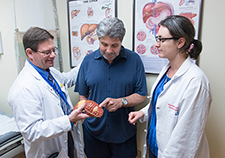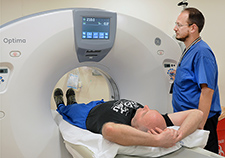Office of Research & Development |
 |

VA Research Currents archive
May 24, 2017
By Mike Richman
VA Research Communications

Carlos Velez, a Marine Veteran who underwent a liver transplant in 2010 at the VA Pittsburgh Healthcare System, meets with clinician-researchers Drs. David Kaplan and Marina Serper at the Corporal Michael J. Crescenz VA Medical Center in Philadelphia. (Photo by Harry Maxwell)
Hepatocellular carcinoma (HCC), a malignancy of the liver, is one of the leading causes of cancer deaths worldwide, with a particularly high incidence in Asia and Africa. The outlook is also bleak among U.S. Veterans, who are contracting the disease at a rate about five times greater than that of the general U.S. population.
At the same time, liver cancer is a complex disease that must be treated by experts from multiple disciplines working in concert: radiologists; hepatologists, who specialize in liver disease; oncologists, who specialize in cancer treatment; interventional radiologists, who focus on non-surgical cancer care; and transplant surgeons.
However, a limited number of VA medical centers have all of these experts in place and working together. Multidisciplinary liver cancer treatment teams are commonly found at university-affiliated VAs. But only 38 percent of VA facilities carry academic affiliation with universities with liver transplant programs, a much smaller fraction than the overall percentage of VA sites with academic ties.
Those are key conclusions in a VA study, published in March 2017 in Gastroenterology, that says patients getting care at VA hospitals with academic ties had "higher odds" of receiving active therapy for hepatocellular carcinoma, specifically a 97 percent greater chance. "Furthermore, because death in patients with HCC generally results from progressive liver failure, often requiring careful temperance of treatment decisions, patients require collaborative or multi-disciplinary care," the researchers write.
"The problem isn't access to care, the problem is access to the best care."
They add: "Future studies should further evaluate modifiable health system and provider-specific barriers to delivering high quality, multi-disciplinary care in HCC to optimize patient outcomes."
Lead author Dr. David Kaplan, a gastroenterologist and hepatologist at the Corporal Michael J. Crescenz VA Medical Center in Philadelphia, was recognized for his work. The study, titled "Association of Provider Specialty and Multi-Disciplinary Care with Hepatocellular Carcinoma Treatment and Mortality," was chosen as a top editor's pick in Gastroenterology for the month of June 2017.
"The problem isn't access to care, the problem is access to the best care," Kaplan says. "Smaller VA centers, like most rural community hospitals, don't have liver cancer experts. Typically, patients are diagnosed late by general gastroenterologists or general oncologists who don't see many liver cancer patients and aren't well-versed in treatment strategies. Also, they are not always savvy about which patients might be candidates for curative therapy."

Unfortunately, he says, most VAs that are not tertiary sites, which provide specialized health care, usually on referral from a primary or secondary provider, are missing critical "pieces of the puzzle" needed to treat liver cancer. "Furthermore, the types of specialists that are at Level 2 and Level 3 VA medical centers are generally not trained to recognize candidates for liver transplantation, which is the most successful treatment that can be offered for some early-stage patients with liver cancer," he says.
Kaplan has long specialized in the study of hepatocellular carcinoma, which accounts for about 95 percent of primary liver cancers in the United States. The roots of HCC often lie with hepatitis C, a blood-borne virus that causes progressive liver damage and cirrhosis over several decades of infection. Cirrhosis may lead to the development of HCC. Alcohol abuse and fatty liver are also frequent causes of cirrhosis among Veterans and can result in HCC.
The Veteran population has a high rate of hepatitis C, with 62 to 64 being the mean age of hepatitis C-related HCC diagnosis. Many in that demographic likely contracted the disease in the late 1960s and 1970s due to intravenous drug abuse and blood transfusions, says Dr. Tamar Taddei, a co-author of the study and head of the liver cancer program at the VA Connecticut Healthcare System. "We see those folks in their 60s who have long established hep C, but now we're seeing a rise in hep C among 18- to 26-year-olds," she says. "That's pretty startling."
So how can Veterans suffering from hepatocellular carcinoma access the best care?
Kaplan points out that each of the 21 U.S. regions in the Veterans Integrated Service Network (VISN) includes at least one VA hospital with expertise to treat liver cancer patients. "The critical process that needs to happen is to break down the silos and create the networks for regional management," he says.
With that in mind, he and his colleagues launched a regional liver cancer tumor board for eastern VISN4, which includes parts of Delaware, Pennsylvania, and New Jersey, in 2014. He says the board came about largely because he was getting referrals from other VA sites where "patients were undergoing diagnostic imaging but radiologists were unaware of the proper liver imaging criteria for diagnosing liver cancer," he says. "By the time cases were being referred, cancers had progressed and patient treatment options had been compromised."
Now, any small facility in VISN4 such as the VA hospital in Lebanon, Pennsylvania, can present a liver cancer case to the board, which is based in Philadelphia. In 7 to 10 days, Kaplan says, the board will have suggested optimal treatment options for the patient that may include bringing him or her to the Philadelphia VA, which is affiliated with the University of Pennsylvania.
"So you don't have to live close to the expert center," he says. "You have to live close to a center with access to the experts at the expert center. That theoretically could be any VA."
One beneficiary of Kaplan's board is Air Force Veteran Pierino De Pari, who lives about two hours from Philadelphia in the town of Lebanon.
In 2015, doctors at the Lebanon VA Medical Center confirmed that De Pari, who had been diagnosed with hepatitis C about a quarter-century prior, had a tumor on his liver. They referred his case to the board, which recommended that he undergo a transarterial chemoembolization at the Philadelphia VA. Interventional radiologists there performed the non-surgical procedure, which delivers chemotherapy medication to blood vessels in the liver that lead to the tumor.
But the chemo wasn't a 100-percent cure. So the board told physicians at the Lebanon VA to refer him to the VA Pittsburgh Healthcare System, one of only six VA liver transplant centers in the country.
"Unfortunately, the general gastroenterologists in Lebanon don't always know which patients should be referred for transplant and which ones shouldn't," Kaplan says. "It's not their expertise, nor is it the expertise of the local oncologists. So prior to the formation of our regional board, a patient like that would likely undergo unnecessary liver biopsies and have delayed access to minimally invasive therapy. By the time he got referred to us, he might have been outside transplant criteria, or if still within criteria his referral to the transplant center may have been delayed."
After waiting four months for a new liver, De Pari underwent successful transplantation surgery at the Pittsburgh VA in January 2016. That facility houses a multidisciplinary team of liver cancer specialists because it's a university affiliated, high-volume liver transplant center, according to Kaplan.
The 57-year-old De Pari, who now has normal life expectancy, says the medical team was "professional all the way through."
"I can't thank them enough," he says. "The whole team is one of the best in the country. I was told before I went in that it was an outstanding team, and after they did the operation I could see why."
It's success stories like De Pari that help fuel Kaplan's passion for his work. His study included nearly 4,000 patients who received liver cancer care from 2008 to 2010 at 128 VA medical centers. Doctors treated 69 percent of the patients at sites with academic affiliation. The majority of the patients lived in urban areas, where most academically affiliated VA facilities are located, and half lived within 74 miles of the closest VA hospital.
The critical factor in determining HCC treatment rates was the type of specialist a patient could access within 30 days of his or her cancer diagnosis. Care by a general gastroenterologist was associated with a reduced likelihood of treatment. Oncology care was linked to higher rates of treatment. Hepatologists were associated with the highest reduction in mortality rate (30 percent, compared with not seeing a hepatologist). Treatment by multiple specialists and multidisciplinary teams led to significantly improved survival rates.
"Our data suggest that hepatologists are most selective at identifying patients that are candidates for aggressive therapy, and at singling out patients that are too sick and are better-serviced with approaches used to relieve suffering," Kaplan says. "As hepatologists, we are obviously biased but feel that liver cancer is a cancer that we're particularly well-suited to oversee."
The study also finds that 24 percent of the HCC patients received no liver cancer care, but Kaplan downplays that statistic. He says studies using national Medicare data have estimated that about 35 percent of the general liver cancer population receive no active HCC treatment.
"Some of that is because non-treatment is sometimes appropriate," he says. "A patient with severely decompensated liver disease should not be treated, unless he or she is a transplant candidate. Similarly, a patient with widespread advanced stage cancer is unlikely to gain a survival advantage, and best supportive care measures such as a hospice may be more appropriate."
In Taddei's view, the private sector also faces hurdles in providing multidisciplinary care to liver cancer patients. "There are often many different providers involved, so these patients need somebody to help them navigate them through a fairly complex care process," she says. "It's equally difficult in the private sector, but VA's probably better able to understand and harness its resources in a concerted way."
In terms of location, the study concludes that patients in the mid-South region had the lowest odds of getting HCC therapy, at 38 percent. But Kaplan emphasizes that geographic factors played a limited role in impacting the survival of patients with hepatocellular carcinoma. He believes VA must instead "focus on improving access for patients who are diagnosed with liver cancer at smaller facilities and get them access to experts who are at the larger facilities."
Kaplan says he hopes the study will influence VA policy, namely greater implementation of regional liver cancer tumor boards. Because the data are from 2008 to 2010, he speculates that some changes may have already been made.
He and his team are now working on a new study that examines the cost of care for Veterans suffering from hepatocellular carcinoma. "I hope that once that dataset is published, VA Central Office will appreciate the magnitude of HCC expenditures and invest appropriate resources to optimize regional management," he says.
In the end, he believes any Veteran such as Pierino De Pari should have access to the "same excellent liver cancer care no matter which VA they walk into."
"Our vision would be that all VISNs incorporate regional liver cancer tumor boards," he says.